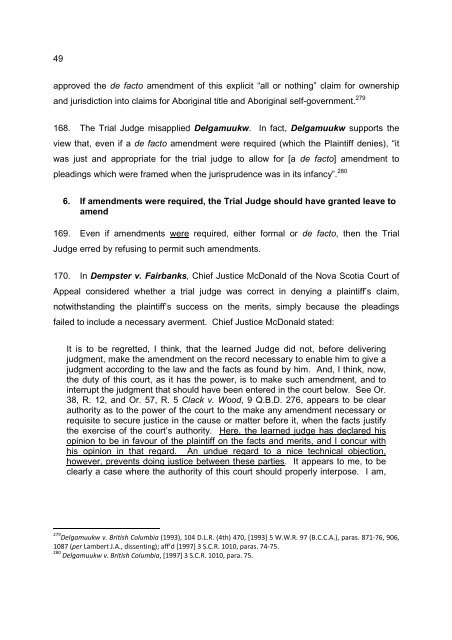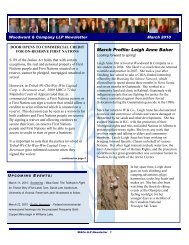48uncertainty”. 272 The meaning of “regular use of definite tracts of land” remainsunresolved and highly contested . There is no guidance to this day as to how suchtracts should be delineated or pleaded.165. Aboriginal rights claims are frequently determined on appeal on a different basisthan they were presented at trial. For example, the lower courts in the R. v. Côtélitigation rendered judgment before the Van der Peet trilogy was decided. TheSupreme Court of Canada, on appeal, frankly conceded that “the courts below did notconsider the possibility that the appellants may have enjoyed a free-standing aboriginalright to fish independent of title”. 273 No such claim was advanced by the appellants. 274Nonetheless, the Court applied the factual findings at trial to conclude that theappellants had established an Aboriginal right to fish for food, notwithstanding no suchright had been claimed or litigated in the courts below. 275166. Flexibility is demanded in the face of considerable legal uncertainty to ensurethat the Tsilhqot’in people are not unjustly penalized for prevailing uncertainty in the law.After a full trial in which Tsilhqot’in occupation throughout the Claim Area was fullycanvassed, the proper recourse is recognition of Aboriginal title along the “boundariesthat are shaped by the evidence”. 276167. It is also noteworthy that in Delgamuukw, the trial judge and this Courtconsidered claims to Aboriginal sustenance rights, even though they were not pleadedby the plaintiffs. 277 In fact, in Delgamuukw (unlike here), plaintiffs’ counsel explicitlyassured the trial judge that their claim was “all or nothing”; that is, “the claim was forownership and jurisdiction, and the plaintiffs were not seeking any lesser relief”. 278Lambert J.A., dissenting, and ultimately the Supreme Court of Canada, nonetheless272 Delgamuukw v. British Columbia, [1997] 3 S.C.R. 1010, para. 75.273 R. v. Côté, [1996] 3 S.C.R. 139, para. 11.274 R. v. Côté, [1996] 3 S.C.R. 139, paras. 35-36.275 R. v. Côté, [1996] 3 S.C.R. 139, para. 37.276 Trial Decision, para. 958.277 Delgamuukw v. British Columbia (1993), 104 D.L.R. (4th) 470, [1993] 5 W.W.R. 97 (B.C.C.A.), paras. 23-25, 263,278-79 (per Macfarlane J.A.); paras. 462-68, 519 (per Wallace J.A.), paras. 1031, 1071 (per Lambert J.A.).278 Delgamuukw v. British Columbia (1993), 104 D.L.R. (4th) 470, [1993] 5 W.W.R. 97 (B.C.C.A.), para. 24 (perMacfarlane J.A.); see also para. 429 (per Wallace J.A.).
49approved the de facto amendment of this explicit “all or nothing” claim for ownershipand jurisdiction into claims for Aboriginal title and Aboriginal self-government. 279168. The Trial Judge misapplied Delgamuukw. In fact, Delgamuukw supports theview that, even if a de facto amendment were required (which the Plaintiff denies), “itwas just and appropriate for the trial judge to allow for [a de facto] amendment topleadings which were framed when the jurisprudence was in its infancy”. 2806. If amendments were required, the Trial Judge should have granted leave toamend169. Even if amendments were required, either formal or de facto, then the TrialJudge erred by refusing to permit such amendments.170. In Dempster v. Fairbanks, Chief Justice McDonald of the Nova Scotia Court ofAppeal considered whether a trial judge was correct in denying a plaintiff’s claim,notwithstanding the plaintiff’s success on the merits, simply because the pleadingsfailed to include a necessary averment. Chief Justice McDonald stated:It is to be regretted, I think, that the learned Judge did not, before deliveringjudgment, make the amendment on the record necessary to enable him to give ajudgment according to the law and the facts as found by him. And, I think, now,the duty of this court, as it has the power, is to make such amendment, and tointerrupt the judgment that should have been entered in the court below. See Or.38, R. 12, and Or. 57, R. 5 Clack v. Wood, 9 Q.B.D. 276, appears to be clearauthority as to the power of the court to the make any amendment necessary orrequisite to secure justice in the cause or matter before it, when the facts justifythe exercise of the court’s authority. Here, the learned judge has declared hisopinion to be in favour of the plaintiff on the facts and merits, and I concur withhis opinion in that regard. An undue regard to a nice technical objection,however, prevents doing justice between these parties. It appears to me, to beclearly a case where the authority of this court should properly interpose. I am,279 Delgamuukw v. British Columbia (1993), 104 D.L.R. (4th) 470, [1993] 5 W.W.R. 97 (B.C.C.A.), paras. 871-76, 906,1087 (per Lambert J.A., dissenting); aff’d [1997] 3 S.C.R. 1010, paras. 74-75.280 Delgamuukw v. British Columbia, [1997] 3 S.C.R. 1010, para. 75.
- Page 1 and 2:
JUN 04 * u|UCOURT OF APPEALCourt of
- Page 3 and 4:
C. Alternative Argument: The Trial
- Page 5 and 6: DateDecember 18,1998October 14,1999
- Page 7 and 8: OPENING STATEMENT1. The Tsilhqot’
- Page 10 and 11: 2then Chief of the Xeni Gwet’in,
- Page 12 and 13: 414. The Tsilhqot’in people inhab
- Page 14 and 15: 6… [T]he proper rights holder, wh
- Page 16 and 17: 8F. Tsilhqot’in Territory and the
- Page 18 and 19: 10bounding the Claim Area. For them
- Page 20 and 21: 12…I am satisfied Tsilhqot’in p
- Page 22 and 23: 1452. The Trial Judge summarized th
- Page 24 and 25: 16records document numerous situati
- Page 26 and 27: 18days, Tsilhqot’in warriors also
- Page 28 and 29: 20declaration because of the manner
- Page 30 and 31: 22• On the west, from Xeni across
- Page 32 and 33: 24part of their oral traditions, pr
- Page 34 and 35: 26declaration of title in accordanc
- Page 36 and 37: 28would have cross-examined witness
- Page 38 and 39: 30circumstances of the case, which
- Page 40 and 41: 32111. In a subsequent motion, the
- Page 42 and 43: 34by the evidence, then the Court c
- Page 44 and 45: 36exactly what declaration he seeks
- Page 46 and 47: 38declaration should be granted”.
- Page 48 and 49: 40occupation sufficient to ground t
- Page 50 and 51: 42(a) The Plaintiff was not require
- Page 52 and 53: 44process and the legal requirement
- Page 54 and 55: 46157. Proof of an ancestral and mo
- Page 58 and 59: 50therefore, of opinion, that all n
- Page 60 and 61: 52land regularly used by the Tsilhq
- Page 62 and 63: 54stated that it depends on the fac
- Page 64 and 65: 56the lands in question. At common
- Page 66 and 67: 58193. Moreover, the Trial Judge’
- Page 68 and 69: 60PART 4 - NATURE OF THE ORDER SOUG
- Page 70 and 71: 62R. v. Marshall; R. v. Bernard, [2



